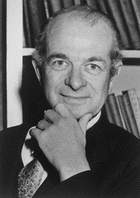

The concept that antibodies may catalyze chemical reactions was first proposed by
Linus Pauling in the 40's. He suggested that an enzyme lowers
the energy barriers of a reaction by stabilizing preferentially the transition state of the substrate
during the reaction rather than the substrate in its ground state.
 |
Linus Carl Pauling, American |
| chemist, was known for | |
| his works on organic | |
| macromolecules and on | |
| chemical links. | |
Twenty years later, William Jencks has proposed a strategy
to prepare new biocatalysts. This strategy was based on the production of antibodies directed against
stable molecules resembling the transition state structure of a specific chemical transformation.
A breakdown in the field came from the development of the monoclonal antibody technique by
Köhler and Milstein that has provided the means for producing
antibodies with a single antigenic defined specificity.
If the first report suggesting that antibodies may act as catalysts was published by the group
of Bernard Green, the demonstration that antibodies may be
tailor-made to catalyze specifically chemical reactions was simultaneously brought by the Californian
laboratories of Richard Lerner and Peter Schultz.
Since these reports, strategies aimed to improve the efficiency of abzymes were developed, including hapten design, immunization strategies, or methods for screenig and selection (see for review Stevenson and Thomas-2000).